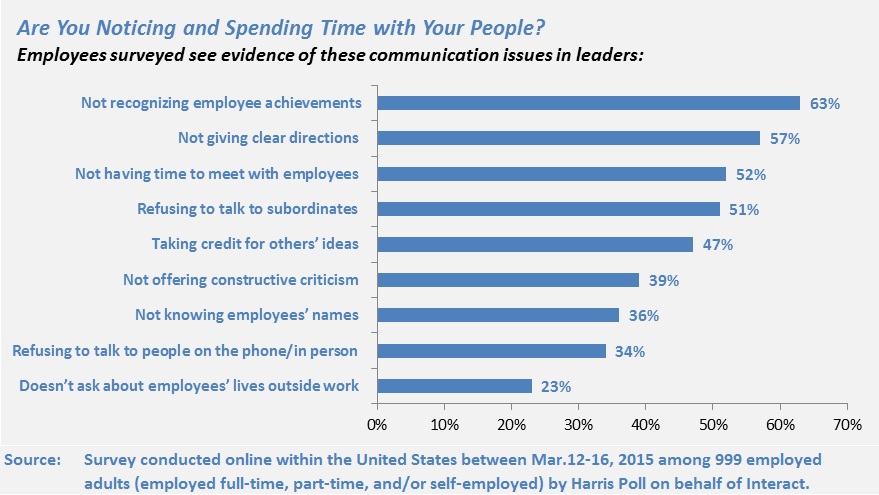In a business environment that demands employee commitment, leaders who make it a point to connect with their people are a step ahead.
Unfortunately, however, 91 percent of America’s workers say communication issues can drag executives down, according to results from a new survey conducted online among roughly 1,000 U.S. workers by Harris Poll on behalf of Interact, a communications consultancy.
“This is startling given that corporations spend extraordinary amounts of money conducting surveys and reorganizations, engaging consultants and implementing change initiatives as a means of keeping in touch with their people,” said Lou Solomon, CEO and founder of Interact, in a statement about the results. “In their everyday interactions, leaders are clearly not making the connections with their workers that can give them a competitive advantage,” she said, referring to the kinds of bosses who never walk around the office, are short on praise, and rarely ask colleagues about their families.
Survey respondents called out everything from micromanaging and bullying to narcissism, indecisiveness and more as communication issues that prevent effective leadership, with the following as the top communication issues they believe prevent business leaders from being effective (in rank order):
According to Solomon, “Communication is the fundamental element of an organization and the pattern is established by leaders. Healthy communication requires trust, inclusion, recognition, clear directions, meaningful interaction and feedback.”
Asserting that clear communication also helps a company’s bottom line and increases productivity, she says the most influential and effective leaders are diligent about building a sense of connectedness with their teams and show appreciation for their employees.
In a statement, Interact gave this list of phrases for leaders to keep in mind when communicating with employees, along with reasons they are important and effective.
- Here’s what I appreciate about you and your contribution…
Ditch the simple “atta-boy” or “atta-girl,” which don’t satisfy people who put their heart and soul into their work. Instead, say something specific like, “I appreciate the way you pull in people from other departments to reach your team goals. You’re a connector.”
Leaders need to notice employees’ unique, specific contributions.
- Thank you (personal and public)
From the elevator to the parking lot, daily interactions represent opportunities for leaders to engage in dynamic interactions and show appreciation for their employee’s efforts.
Public recognition at a staff meeting, or a thoughtful “thank you” in a newsletter, are also meaningful.
- What do you think?
Employees often withhold their best ideas from leaders who always have the ‘right’ answer, or take credit for others’ ideas. Ask questions such as, “What have you noticed, how do you think we could improve, what is keeping us stuck, and what do you love about it?”
Establish a safe environment in which people have the opportunity to express themselves and be recognized for their ideas and they will take ownership of the results.
- Here’s what’s happening and what you can expect
Companies today often operate in a state of change and all too often information is withheld until the last minute. This is a huge distraction for employees, who need “real speak” about their futures.
Leaders often underestimate employees’ ability to accept “why” if it is shared in an honest way. Leaders will gain deep respect when they share as much as they know as soon as they can share it. Explanations are better than no explanations.
- I have some feedback for you
Don’t wait for a performance review to tell people how they’re doing. A culture of continual feedback is healthy and nimble.
- Let me share a time I got it wrong
Smart, capable leaders who know their stuff are well respected, but employees like and trust leaders who are not only smart, but can occasionally lean back and laugh at their own mistakes and who are generous with what life has taught them. The effective leader says, “Let me tell you about something I learned the hard way,” instead of dictating the course to take.
About the Survey
The survey was conducted online within the United States between Mar. 12-16, 2015 among 999 employed adults (employed full-time, part-time, and/or self-employed) by Harris Poll on behalf of Interact.
About Interact
Interact is a communications consultancy that helps Fortune 500 CEOs, business leaders, managers, entrepreneurs and their teams to develop authenticity, make connections, earn trust and build influence.
Source: Interact






















 Is Risk the Main Ingredient in Ultra-Processed Food?
Is Risk the Main Ingredient in Ultra-Processed Food?  The Future of HR Is AI
The Future of HR Is AI  State Farm Inked $1.5B Underwriting Profit for 2025; HO Loss Persists
State Farm Inked $1.5B Underwriting Profit for 2025; HO Loss Persists  New Texas Law Requires Insurers Provide Reason for Declining or Canceling Policies
New Texas Law Requires Insurers Provide Reason for Declining or Canceling Policies 











